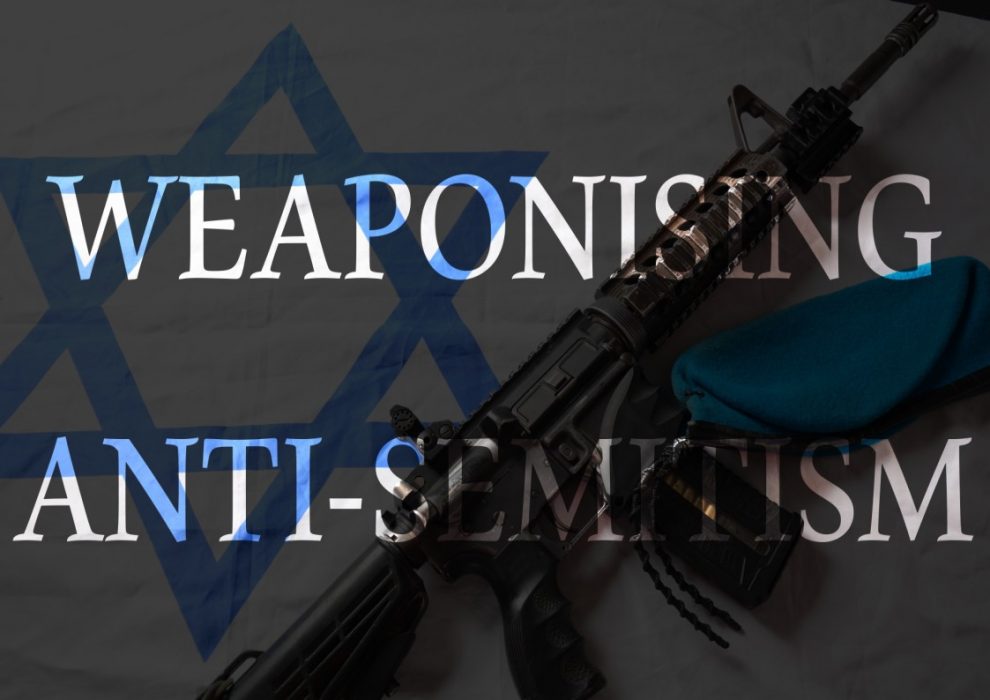Israel strategically employs antisemitism claims and far-right alliances in Europe to stifle pro-Palestinian dissent, undermining democracy.
Accusations of antisemitism serve as Israel’s primary tactic to silence critics of its policies in Palestine, bolstered by European far-right support. These measures suppress pro-Palestinian advocacy and threaten freedoms of expression, human rights, and democratic integrity. Policies in countries like Germany, framed as efforts to fight antisemitism, expose the depth of Israel’s sway in shaping European laws and narratives.
In countries like Germany, citizenship restrictions enacted under the guise of combating antisemitism have emerged as a significant obstacle to criticisms of Israel. Israel’s strategic maneuvers not only limit pro-Palestinian movements but also undermine freedom of expression, human rights, and democratic values.
Dr. Muhammed Ersin TOY
Media Strategist
The genocide perpetrated by the Israeli terrorist state against Palestine is not merely a regional issue of the Middle East; it has become a global concern for all humanity. This is because the genocide carried out by terrorist Israel significantly impacts global human rights, freedom of expression, and international politics. Israel’s strategy to suppress global criticism of its oppression and terror in Palestine relies on accusations of antisemitism and the “othering” hostility promoted by Europe’s rising far-right movements. This approach has become a tool to neutralize pro-Palestinian movements and ideas. Through media control and collaborations with far-right groups, Israel exerts influence over global public opinion and European governments.
In this context, antisemitism, a concept originally developed to combat historical prejudices against Jewish communities, has been strategically employed to suppress and silence those who criticize Israel’s foreign policies, sparking major debates in the international arena.
The Silencing Weapon of “Antisemitism”
To express it more explicitly: the genocide carried out by the Israeli terrorist state against Palestine is accused of violating global human rights norms, and criticisms of Israel’s policies are being suppressed through allegations of antisemitism. Israel’s use of antisemitism as a defensive strategy to weaken pro-Palestinian movements has led to debates concerning freedom of expression and human rights on the international stage. Particularly in Europe, labeling criticisms of Israel as antisemitism has caused pro-Palestinian supporters to face sanctions such as discrimination, repression, and even the revocation of citizenship. This situation reveals the extent of Israel’s influence over European states and its capacity to manipulate these processes.
Throughout history, Israel has used claims of experiencing genocide to impose a sense of indebtedness on European states, thus dictating its policies. By dominating European states through the narrative of antisemitism, Israel simultaneously seeks to silence and marginalize the public through fear and perception manipulation.
Today, far-right parties across Europe support Israeli policies while also establishing a strategic parallel with Israel through their anti-Muslim rhetoric. This has led to criticism that anti-Muslim sentiment in Europe indirectly supports Israel’s policies against Palestine. The support of Europe’s far-right movements for Israel’s anti-Palestinian policies not only silences criticism of Israel but also fosters prejudice and hostility against Muslims in European societies.
In this context, the strategic use of antisemitism accusations to suppress criticism of Israel’s policies toward Palestine and how these accusations reinforce an anti-Muslim political climate in Europe are notable. The unconditional support of Israel’s policies by Europe’s far-right parties and their transformation of the concept of antisemitism into anti-Muslim policies contribute to the marginalization of all pro-Palestinian discourse in Europe.
Pro-Palestinian Supporters at Risk of Losing Citizenship
In recent years, Germany has debated the revocation of citizenship for dual nationals convicted of antisemitic crimes as part of its efforts to combat antisemitism. States like Bavaria, Saxony, North Rhine-Westphalia, and Hesse have proposed revoking citizenship for individuals convicted of antisemitic offenses. Today, not only those accused of antisemitism but also citizens supporting Palestine face similar threats, creating a new point of contention in Germany. German Interior Minister Nancy Faeser has advocated for stricter measures against antisemitism, supporting the tightening of policies in this regard. Additionally, in Saxony-Anhalt, individuals applying for German citizenship are required to submit a written statement affirming their support for Israel’s right to exist. Germany’s new citizenship laws explicitly mandate acceptance of Israel’s right to exist, and applicants who fail to comply are denied citizenship.
While these measures demonstrate Germany’s commitment to combating antisemitism, equating criticisms of Israel with antisemitic rhetoric raises significant concerns about freedom of expression within the international community. Such policies amplify fears that the concept of antisemitism could be weaponized to silence criticism of Israel’s policies against Palestine, thereby calling into question the neutrality of Germany’s approach in this context.
Antisemitism Laws in Europe
European countries have adopted various legal measures against antisemitism. Eighty percent of European states have embraced Israel’s definition of antisemitism, providing a comprehensive framework for combating hate crimes. Ninety percent of European countries have outlawed Holocaust denial, with stringent enforcement in Germany, France, Belgium, and Austria. In the United Kingdom, Holocaust denial is addressed indirectly under hate speech laws. All European countries have regulations against antisemitic and racist hate speech.
Zıonıst Strategy
One of the notable examples illustrating how accusations of antisemitism can be used as a strategic tool for suppression occurred during the Ajax-Maccabi Tel Aviv football match in Amsterdam. During the match, Israeli fans forcibly removed Palestinian flags and attacked Arab supporters. Following the incident, the Israeli government framed the event as “anti-Semitic attacks” and called on the Dutch government to protect Israeli citizens, demanding a response through accusations of antisemitism. The Dutch government’s swift alignment with Israel in this incident demonstrates how antisemitism can be strategically employed as a tool of pressure.
At the same match, Israeli fans refused to participate in a moment of silence for victims of flooding in Spain and chanted provocative slogans such as, “There are no schools in Palestine because there are no children.” These actions reveal how antisemitism operates as a political instrument. This incident highlights how Israel’s policies toward Palestine provoke controversy even in daily life and how Israel makes strategic moves to counter these criticisms.
Israel’s use of antisemitism accusations is not confined to the international level but is also employed domestically to suppress dissenting voices. For instance, Israeli Knesset member Ofer Cassif was suspended from the Knesset for six months for describing military operations in the Gaza Strip as “deliberate genocide.” Human rights defenders and activist politicians like Cassif face accusations of antisemitism for criticizing Israel’s policies toward Palestine. This raises further concerns about Israel’s restrictive stance on freedom of expression.
Academıcs Under Pressure
Israel’s use of antisemitism accusations to suppress pro-Palestinian criticism is a common issue within the academic world. In countries like the United States and the United Kingdom, academics with pro-Palestinian views frequently face accusations of antisemitism. In the UK, university professor David Miller was accused of antisemitism and dismissed from his position for criticizing Israel’s policies toward Palestine. Similarly, Rutgers University professor Jasbir Puar in the US encountered career obstacles for her scholarly work addressing Israel’s violations in Palestine. The impact of antisemitism accusations on academic freedom and the challenges faced by academics in continuing their research reveal the extent of this suppression.
Medıa Suppressıon
Media control and perception management play a central role in Israel’s strategies to suppress criticism of its policies toward Palestine. Traditional media outlets and social media platforms amplify pro-Israel narratives while sidelining criticisms of Israel. In Western countries like the US and the UK, Israel’s influence over the media limits the public resonance of anti-genocide perspectives. For example, leading US media outlets such as The New York Times and The Washington Post frequently highlight pro-Israel content while giving limited space to pro-Palestinian perspectives. Similarly, global digital platforms often remove, manipulate, or distort content favorable to Palestine. Such media strategies reduce global awareness of human rights violations in Palestine and create a perception managed by narratives supported by antisemitism rhetoric. Israel’s influence over the media hinders the public’s access to impartial information. Media control emerges as an effective tool for curbing criticism of genocide.
Freedom Of Expressıon Under Threat
Israel uses accusations of antisemitism, media manipulation, and strategic alliances with far-right movements in Europe to neutralize criticisms of its policies in Palestine. In countries like Germany, citizenship restrictions introduced under the guise of combating antisemitism have become a significant barrier to voicing criticism of Israel. These strategies not only suppress pro-Palestinian movements but also undermine freedom of expression, human rights, and democratic values.
Israel’s leveraging of anti-Muslim rhetoric from Europe’s far-right groups to gain support further restricts critical discourse. In an op-ed published in Le Monde, Gilles Paris noted that all 20 parties in the European Parliament most supportive of Israel were far-right and Euroskeptic, particularly conservative and reformist parties. This dynamic is seen as a direct result of Israel’s strategy under Netanyahu’s government to diversify alliances, enabling Tel Aviv to apply pressure within Western capitals through domestic actors.
Another example of far-right support for Israel is seen in the comments of French far-right politician Marion Maréchal, who stated, “Recognizing the Palestinian state would mean recognizing an Islamist state with all the dangers it represents for Israel and the West in general.” Maréchal’s stance illustrates the far-right’s perspective on the Palestinian issue and how such rhetoric strengthens Israel’s international legitimacy.
Gilles Paris also wrote, “Political movements rooted in the dark hours of World War II and the Holocaust long kept their distance from Israel.” However, this historical gap has narrowed to the point where Israel’s current government has formed common ground with Europe’s far-right parties, including the most extreme and violent factions. This transformation underscores the evolving relationship between Israel and far-right movements.
Conclusıon
Will Europe’s far-right movements become tools of Israel’s Zionist political agenda, or will Europe liberate itself from the historical chains of antisemitism to achieve a more open political framework? This question stands as one of the most critical issues facing European politics and the international community today. Within this context, the Palestinian issue serves as a litmus test for global values of human rights and universal justice.






